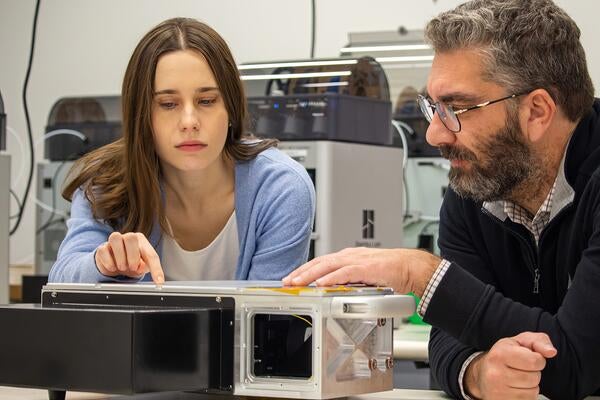
RSVP: Responding to a need
Researcher sees global impact for mobile phones that smartly translate and answer spoken questions

Researcher sees global impact for mobile phones that smartly translate and answer spoken questions
By Christian Aagaard Communications and Public AffairsWho is the prime minister of Canada? Ask Ming Li’s cell phone.
 Li, a professor at the University of Waterloo’s David R. Cheriton School of Computer Science is working on RSVP - a multiple-language voice interface with the Internet, via smartphone.
Li, a professor at the University of Waterloo’s David R. Cheriton School of Computer Science is working on RSVP - a multiple-language voice interface with the Internet, via smartphone.
Ask a question, it will answer.
Li is hoping that RSVP will open up the Web to millions of people who don’t have Internet access or speak English.
In places where there is little wired infrastructure for home computers and conventional phones, smartphones offer access to the wide world of knowledge on the web. Speech makes them easier to use.
Third World connections
“Smartphones are a way of life in many Third World countries,” Li says. “They don’t have land lines because it is too expensive to connect. They have passed that stage.”
Li, who has gained acclaim for his expertise in bioinformatics, describes RSVP as his “fun” area of study. Partners include researchers at Tsinghua University in Beijing, with which Waterloo has a collaborative agreement.
Li is using his expertise in informational distance – the spaces separating pieces of information – to develop RSVP. While voices on smartphones already exist, Li wants to enrich the experience by speeding up the processing.
Degrees of separation
Informational distance is an important component of computer science. Narrowing those gaps, by looking for patterns and similarities among bits of data, speeds up processing. The trick is to develop programs that can also deal with such abstract features as nuance and concept.
Li’s work could lead to programs that competently understand idiomatic speech, and accurately translate between languages. A user asking, “What the heck is the weather today?’’ should get as clear an answer as if he had asked, “What is the weather today?
“If you want the interaction with new technology to be more natural, you need devices that act in a natural way,’’ says Li, a 2010 Killam Prize winner. “We want new technology that understands what we want.’’

A car’s exhaust pipe emits black carbon. This sooty form of pollution alters the “light environment” beneath the snow, affecting plant growth. (Kmatija/Getty Images)
Read more
Research into light and snow interactions provides new insights into how pollution can affect vegetation growth and impact ecosystems

Read more
Phantom Photonics’ quantum remote sensing technology offers precision for industries operating in extreme environments

Read more
How machine learning empowers collaboration between computer science, math and medical research
The University of Waterloo acknowledges that much of our work takes place on the traditional territory of the Neutral, Anishinaabeg, and Haudenosaunee peoples. Our main campus is situated on the Haldimand Tract, the land granted to the Six Nations that includes six miles on each side of the Grand River. Our active work toward reconciliation takes place across our campuses through research, learning, teaching, and community building, and is co-ordinated within the Office of Indigenous Relations.